21世纪大学英语Unit1collegelife
- 格式:pptx
- 大小:6.39 MB
- 文档页数:60
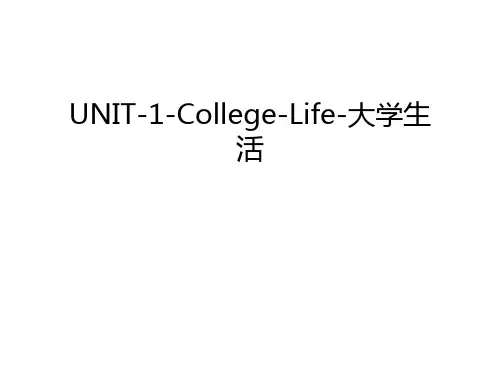
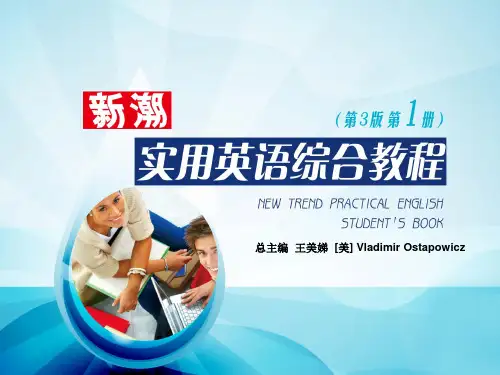
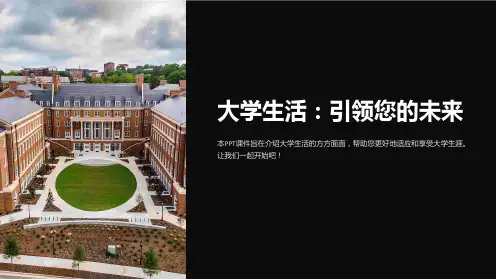
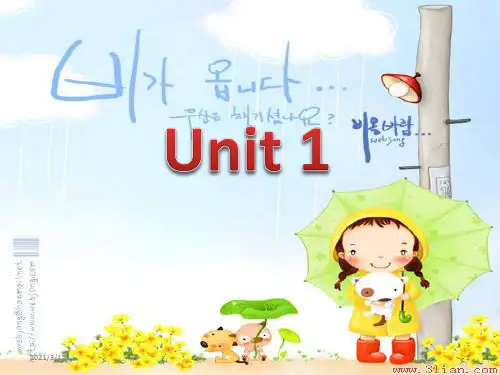
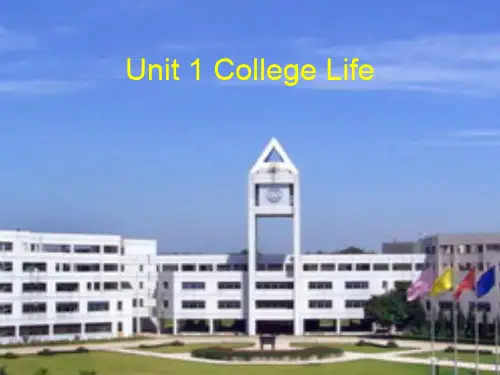
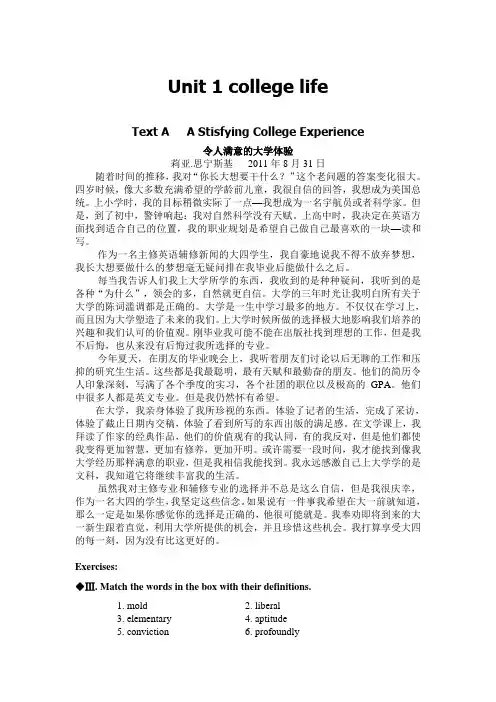
Unit 1 college lifeText A A Stisfying College Experience令人满意的大学体验莉亚.思宁斯基2011年8月31日随着时间的推移,我对“你长大想要干什么?”这个老问题的答案变化很大。
四岁时候,像大多数充满希望的学龄前儿童,我很自信的回答,我想成为美国总统。
上小学时,我的目标稍微实际了一点—我想成为一名宇航员或者科学家。
但是,到了初中,警钟响起:我对自然科学没有天赋。
上高中时,我决定在英语方面找到适合自己的位置,我的职业规划是希望自己做自己最喜欢的一块—读和写。
作为一名主修英语辅修新闻的大四学生,我自豪地说我不得不放弃梦想,我长大想要做什么的梦想毫无疑问排在我毕业后能做什么之后。
每当我告诉人们我上大学所学的东西,我收到的是种种疑问,我听到的是各种“为什么”,领会的多,自然就更自信。
大学的三年时光让我明白所有关于大学的陈词滥调都是正确的。
大学是一生中学习最多的地方。
不仅仅在学习上,而且因为大学塑造了未来的我们。
上大学时候所做的选择极大地影响我们培养的兴趣和我们认可的价值观。
刚毕业我可能不能在出版社找到理想的工作,但是我不后悔,也从来没有后悔过我所选择的专业。
今年夏天,在朋友的毕业晚会上,我听着朋友们讨论以后无聊的工作和压抑的研究生生活。
这些都是我最聪明,最有天赋和最勤奋的朋友。
他们的简历令人印象深刻,写满了各个季度的实习,各个社团的职位以及极高的GPA。
他们中很多人都是英文专业。
但是我仍然怀有希望。
在大学,我亲身体验了我所珍视的东西。
体验了记者的生活,完成了采访,体验了截止日期内交稿,体验了看到所写的东西出版的满足感。
在文学课上,我拜读了作家的经典作品,他们的价值观有的我认同,有的我反对,但是他们都使我变得更加智慧,更加有修养,更加开明。
或许需要一段时间,我才能找到像我大学经历那样满意的职业,但是我相信我能找到。
我永远感激自己上大学学的是文科,我知道它将继续丰富我的生活。
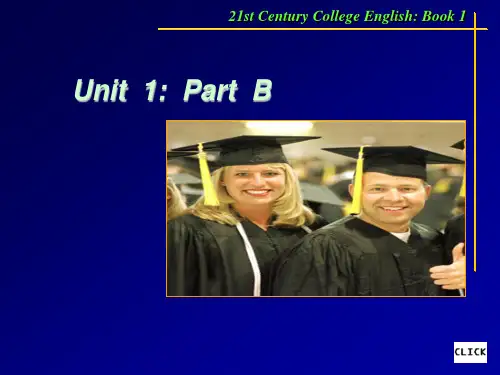
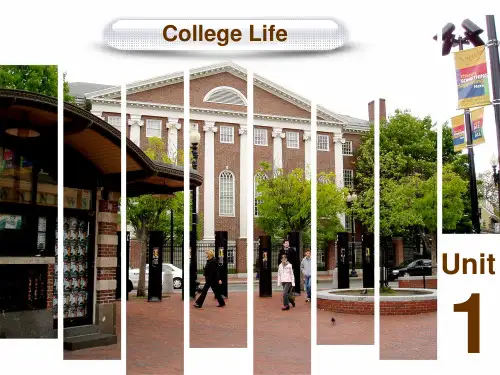
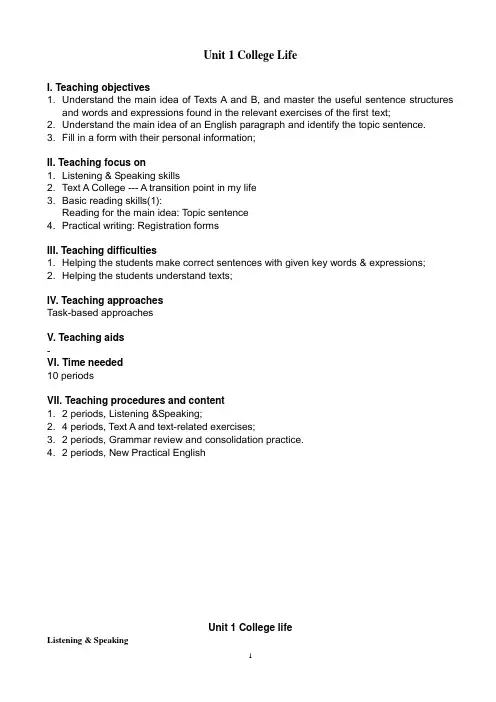
Unit 1 College LifeI. Teaching objectives1. Understand the main idea of Texts A and B, and master the useful sentence structuresand words and expressions found in the relevant exercises of the first text;2. Understand the main idea of an English paragraph and identify the topic sentence.3. Fill in a form with their personal information;II. Teaching focus on1. Listening & Speaking skills2. Text A College --- A transition point in my life3. Basic reading skills(1):Reading for the main idea: Topic sentence4. Practical writing: Registration formsIII. Teaching difficulties1. Helping the students make correct sentences with given key words & expressions;2. Helping the students understand texts;IV. Teaching approachesTask-based approachesV. Teaching aids-VI. Time needed10 periodsVII. Teaching procedures and content1. 2 periods, Listening &Speaking;2. 4 periods, Text A and text-related exercises;3. 2 periods, Grammar review and consolidation practice.4. 2 periods, New Practical EnglishUnit 1 College lifeListening & SpeakingLead inThe teacher explains the Lead-in so that the students will have some idea of what this unit is about. Then, the teacher writes the word “freshmen” on the blackboard and lets the studentsA. guess the meaning of the word;B. tell how they feel now that they are in college and what problems they have;C. have a look at the words and expressions in the box;D. watch the video and tell what is said in the video with help from the teacher;E. do the True or False exercise and watch the video again;F. exchange their views on life in college.Listening & SpeakingAfter the Lead-in, the teacher asks the students to do the following:1) Introducing YourselfA. Listen to the first half of the short talk in Ex. 1 twice and fill in the missing words;B. Listen to the second half of the short talk in Ex. 1 twice and fill in the missing words;C. Listen to the whole short talk and do Ex. 2.2) Getting to Know PeopleA. Go through the new words in Ex. 3 and listen to the conversation twice while filling in the missing words;B. Answer the questions by way of group discussion or the traditional teacher-student interaction;C. Do Ex. 4 in pairs;D. Go through the new words in Ex. 5 and watch the video twice while filling in the missing words;E. Do Ex. 6 in pairs. One student asks the question and the other student answers it. Then they switch roles anddo it again.3) Listening PracticeBefore ending class, the teacher tells the students how to do the exercises in Listening Practice as their homework. The teacher also tells the students that they should be prepared to answer the questions and give an oral presentation in class when they next come to class.Text A College – A Transition Point in My Life1) StarterAfter a brief explanation of the instructions, the teacherA. let the students list the things that they were excited and worried about when they first got to college. This can be done in complete English sentences or just phrases. If the students have difficulty doing this, the teacher should provide them with the following key words in English: (for things students may be excited about) beautiful campus, good library, teachers and classmates, the computer room, the environment, new way of life, etc.; and (for things students may be worried about) being away from home, the food, competition with other students, difficulties in study, washing clothes, taking a bath or shower, new teachers, etc.;B. organizes pair work or group discussion among the students, which should last for about 5 minutes only, and then gives the students 10 minutes to read Text A and find out the things that worried the writer when he first got to college.2) Text A: College — A Transition Point of My LifeThe teacherA. discusses the whole text with the students;B. guides the students through the exercises, focusing on certain items or leaving some exerci ses as the students’ homework a ccording to the students’ levels.Read the new words and expressionsParagraph 11. Transition: n. (instance of) changing from one state or condition to another 过渡;转变2. Title of Text A: Author Unknown: The name of this writer is not known. 佚名作者.Language Points1. Enter: vt. go or come into (a place) 进入 e.g. enter a room/ a house 进入房间/房子As soon as he entered the room, he saw his father and mother.他一进屋就看到了父母。
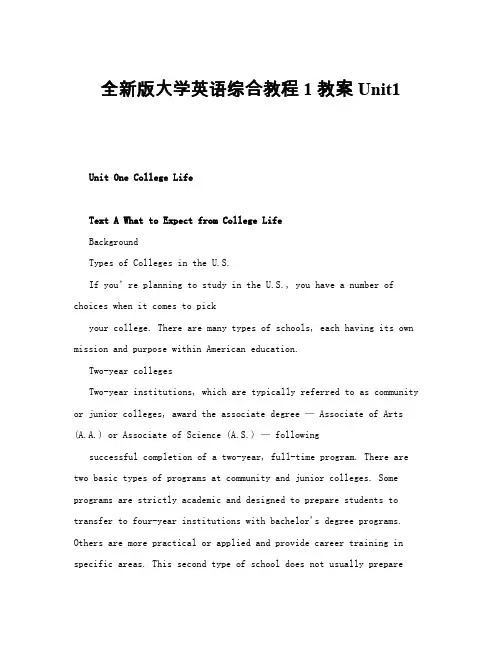
全新版大学英语综合教程1 教案Unit1Unit One College LifeText A What to Expect from College LifeBackgroundTypes of Colleges in the U.S.If you’re planning to study in the U.S., you have a number of choices when it comes to pickyour college. There are many types of schools, each having its own mission and purpose within American education.Two-year collegesTwo-year institutions, which are typically referred to as community or junior colleges, award the associate degree — Associate of Arts (A.A.) or Associate of Science (A.S.) — followingsuccessful completion of a two-year, full-time program. There are two basic types of programs at community and junior colleges. Some programs are strictly academic and designed to prepare students to transfer to four-year institutions with bachelor's degree programs. Others are more practical or applied and provide career training in specific areas. This second type of school does not usually preparestudents for transfer to a four-year institution, though some of the credits earned may still be accepted by a four-year institution.A small number of two-year colleges offer the final two years of the undergraduate program only, awarding the bachelor‘s degree rather than the associate degree. Most community and juniorcolleges are publicly supported by the state and local communities, although some are private. Some private two-year colleges areproprietary or run for a profit.Four-year colleges and universitiesThe college or university (sometimes called an institute when it emphasizes engineering or other technical courses) awards the bachelor's degree. The Bachelor of Arts (B.A.) or Bachelor of Science (B.S.) degrees are the most common, but a variety of bachelor's degrees by other names are also granted. Bachelor's degrees are typically awarded following successful completion of a four-year, full-time program. Programs in some fields of study or at some institutions can be longer than four years. There are both public and private colleges and universities in the United States, and some have an affiliation with a religious denomination.Public versus privatePublicly supported schools are generally state colleges or universities or two-year community colleges. These institutions receive most of their funding from the states in which they are located. Private schools generally have higher costs because they do not receive the sameprimary funding from the state and federal government. Colleges and universities with religious affiliations are private. Most of them are Christian (Roman Catholic and Protestant), although there are a small number of Jewish and Islamic institutions. In most cases, you do not need to be a member of a particular church or religious group to attend a religiously affiliated college and enrollment in these institutions will not usually interfere with your own religious views. Privately owned colleges Proprietary institutions are different from other types of schools in that they are privately owned and run for a profit. They are "educational businesses" that offer services and courses similar to those at other institutions, but you need to be very careful and research their accreditation status. Their programs tend to be technical and pre-professional courses of study.Almost all the colleges in the United States are now coeducational, which means that both men and women attend. There are also a small number of single-sex schools, some for men and some for women. Faculty, administration, and staff members will likely be of both sexes at any college.Words and Expressions1.a little bit有点He was a little bit under the weather. , 他生病了。
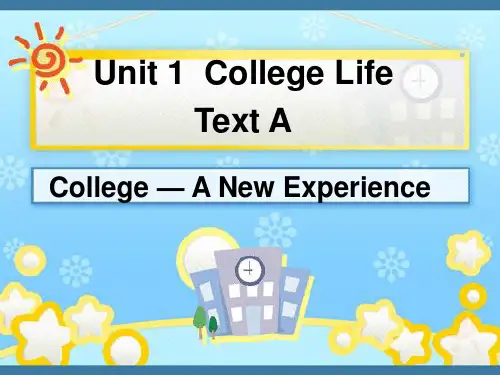
Unit1 College lifePeriod: 2Teaching Content: Unit1 College life (1)Listening and Speaking ,Reading Text AAims of Teaching1. To improve the listening and speaking abilities of Ss’2. To improve Ss’ reading ability.Main points in teaching1. Understand the main ideas of Text A and master the useful sentence structures, words and expressions.2. Develop ss’ basic language skills by listening and speaking.Difficult points in teachingUnderstanding of some difficult sentencesTeaching procedures:The first periodStep1 Lead-in1.This is the first class of the new semester. I haven’t met my students before, so it is the first time that we’ve met each other. First, I’ll break the ice by introducing myself to the students. Then, I’ll ask them what kind of college life they hope for? What’s their impression on the college? What are they going to do after graduation? hoping that they can learn a lot and practice what they have learned into practice so that they can lay a very good foundation for their future professional careers, and they can enjoy their college life.2.Some requirements for ss1) Each student will be required to make a report at the beginning of class2) All students are divided into 10 learning groups, with 4 students a group and a group reader will be chosen by themselves3. Tips on how to learn English well at collegeStep2 Listening1. Activity 1 Sound Recognition2. Activity 2 Conversation3. Activity 3 PassageQuestions and Answers1. Q: What is the weather like in Britain?A: It is cool in summer and warm in winter.2. Q: When do the winds bring cool air to Britain?A: In summer.3. Q: Why isn’t there much difference between the summer and winter weather?A: Because the winds from the west blow Britain all the year.4. Q: In which part of Britain is there less rain?A: In the east.5. Q: What is the passage mainly talk about?A: The weather in Britain.Step3 SpeakingThis activity mainly focuses on going over some useful expressions, and how to use them in a real dialog1. Activity 1A: Good morning, Wang Xiaoping.B: Good morning, Huang Linwei.A: How are you this week?B: Just fine. Thank you. And you?A: I’m fine, too. Thank you.A: Hello, Jane.B: Hello, David.A: How are you doing these days?B: Fine, thanks. How about you?A: I’m fine, too. Thank you.B: Is Grace well now?A: She is very well. She is now in China.B: That’s good.The second periodStep4: DiscussionWhat kind of college students do you expect to be?S1:Before I entered the college, I had a dream that I could become the top student in my class. When I woke up, I was determined that I should try my best to make my dream come true. So now I study very hard, and I am sure that my dream will come true some day.S2:After I came to the college, I think that I should develop myself in every field. First, I should study well, and then I should take most of the students’ activities if I am free. I hope that I can become the chairman of the students’ union of our college, because I can have more chances for practice. In that way, I can learn much more.S3:I hope that I can study well at college. For example, I can read a lot of books, learn a lot from my teachers and classmates, pass every examination and become one of the top students in my class.S4:I hope that I can fully develop myself. First, I can learn as much as I can and pass all the examinations easily. Then, I can make a lot of friends on and off campus so that I can easily get a job after my graduation.Step 5: Fast reading1 Ask ss to read Text A as fast as they can and get the general idea of the passage. Then finish the “reading comprehension” on p82. Close books and concentrate on the recording of Text A3. Read the text aloudStep6 Homework1. Recite the new words on Text A and understand Text A2. Finish off Exs on p10-13。
大学体验英语综合教程1第二版课后答案全Unit1 college life学无止终考的最后一天,东部一所的大学里,一群大四的工科生聚集在一幢教学楼的台阶上,谈论着即刻就要开始的考试。
他们脸上都充满自信。
在参加即将到来的毕业典礼和从事未来的工作前,这是他们最后一门考试。
他们有的谈起了已经找到的工作,有的则谈论着要找的工作。
4年的大学学习给了他们全部的自信,使他们觉得自己足以征服世界。
眼前这场考试,不过是小事一桩。
这门课的教授已经说过,除考场上不能交头接耳外,允许他们带任何书或笔记到考场。
考生们依次进入考场,心情轻松而愉快。
当教授把考卷发给在座的考生后,学生们脸上的笑容更加灿烂,因为考卷上只有五道论述题。
她扫视着一张张焦虑的脸问道:“5道题答完的有多少?”没人举手。
“答完4道的有多少?”还是没有人举手。
“完成3道题的?2道题的?”考生们有些坐不住了,不安地动了动。
“那么,有没有写完一道题的?我想总有人做完一道题吧!”考场里还是一片寂静。
教授放下手中的考卷,说:“果真不出我所料。
”“我只是想让你们牢牢记住,即使你们已经学完了4年工科课程,在这个领域里,你们还有很多东西不懂。
在你们今后的日常工作中,类似于今天考卷上你们无法回答的问题很常见。
”接着,她微笑着补充说:“你们都会通过考试,但是请记住,即使你们现在已经毕业了,你们的学习才刚刚开始。
”多年后,这位老师的姓名已经被淡忘,但她的教诲却深深地刻在记忆中。
五、长难句解析1. On the steps of one building, a group of engineering seniors huddled, discussing the exam due to begin in a few minutes. (Para. 1)→解析:engineering seniors指工科专业的第四年级的学生。
discussing 是非谓语结构,引导伴随状语。
2. On their faces was confidence. (Para. 1)→解析:On their face. 英语句子中重点强调的内容多位于句尾,本句强调confidence(自信)所以用倒装形式则非常恰当。